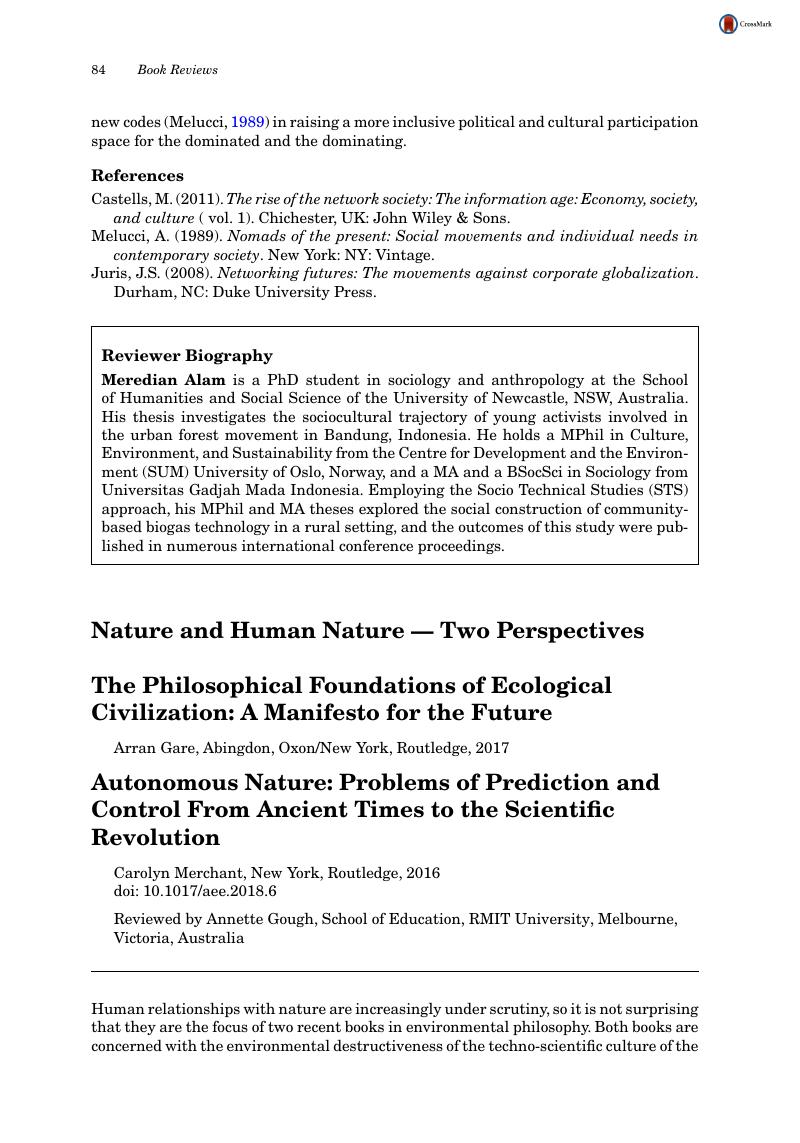No CrossRef data available.
Article contents
Nature and Human Nature — Two Perspectives - The Philosophical Foundations of Ecological Civilization: A Manifesto for the Future Arran Gare, Abingdon, Oxon/New York, Routledge, 2017 - Autonomous Nature: Problems of Prediction and Control From Ancient Times to the Scientific Revolution Carolyn Merchant, New York, Routledge, 2016
Published online by Cambridge University Press: 23 April 2018
Abstract
An abstract is not available for this content so a preview has been provided. Please use the Get access link above for information on how to access this content.

- Type
- Book Review
- Information
- Copyright
- Copyright © The Author(s) 2018
References
Barad, K. (2007). Meeting the universe halfway: Quantum physics and the entanglement of matter and meaning. London: Duke University Press. https://doi.org/10.1215/9780822388128Google Scholar
Code, M. (2017). Review of The philosophical foundations of ecological civilization: A manifesto for the future. Environmental Philosophy, 13, 299–302. https://doi.org/10.5840/envirophil201613240Google Scholar
Gare, A. (2010). Toward an ecological civilization: The science, ethics, and politics of eco-poiesis. Process Studies, 39, 5–38. https://doi.org/10.5840/process20103912Google Scholar
Gare, A. (2017). The philosophical foundations of ecological civilization: A manifesto for the future. Abingdon, Oxon and New York, NY: Routledge.Google Scholar
Gough, A. (1997). Education and the environment: Policy, trends and the problems of marginalisation. Melbourne, Australia: Australian Council for Educational Research.Google Scholar
Harding, S. (1986). The science question in feminism. Ithaca, NY: Cornell University Press.Google Scholar
Hayles, K. (1999). How we became posthuman: Virtual bodies in cybernetics, literature, and informatics. Chicago, IL: University of Chicago Press.CrossRefGoogle Scholar
Latour, B. (1993). We have never been modern. Cambridge, MA: Harvard University Press.Google Scholar
Merchant, C. (1980). The death of nature: Women, ecology and the scientific revolution. New York, NY: Harper and Row.Google Scholar
Merchant, C. (1992). Radical ecology: The search for a livable world. New York, NY: Routledge.Google Scholar
Merchant, C. (2003). Reinventing Eden: The fate of nature in Western culture. New York, NY: Routledge.Google Scholar
Merchant, C. (2016). Autonomous nature: Problems of prediction and control from ancient times to the scientific revolution. New York, NY: Routledge.Google Scholar
Park, K. (2006). Women, gender, and utopia: The death of nature and the historiography of early modern science. Isis, 97, 487–495. https://doi.org/10.1086/508078Google Scholar
Soper, K. (1995). What is Nature? Culture, politics, and the non-human. Oxford: Blackwell.Google Scholar
Warren, K.J. (2015). Feminist environmental philosophy. Stanford Encyclopedia of Philosophy. Retrieved from https://plato.stanford.edu/entries/feminism-environmental/Google Scholar
Worsham, L., & Olson, G. (Eds.). (2008). Plugged in: Technology, rhetoric, and culture in a posthuman age. Cresskill, NJ: Hampton Press.Google Scholar


